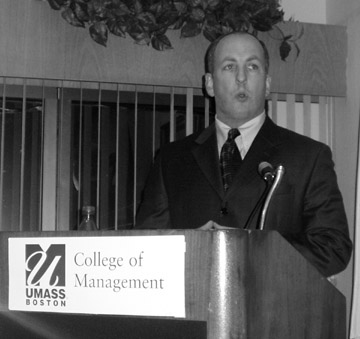Senator Calls State of State “Grim”

Senator Brian Joyce makes a cold appraisal of the state´s fiscal situation. – Photo by Shaun Krisher
November 20, 2003
A state senator called the budget outlook for next year “grim” and “very challenging” at a Senior Executive Forum, held by the College of Management last week. State Senator Brian A. Joyce, who represents the districts of Norfolk, Bristol, and Plymouth, addressed a crowd of College of Management students on the state of the state, saying, “We were better prepared, I think, than any other state in the union. As a percentage of our state budget, we had more socked away than anyone in a rainy day fund, which helped absorb many of the cuts which would have been otherwise much worse.”
But painful cuts still lie ahead, especially for higher education. “We’ve seen a retreat. We’ve seen the funding for this university the last couple years not made the priority that it has been in the past,” said the four-term senator, criticizing past cuts. “And I think, again, that’s not just poor social policy. It’s poor economic policy.”
Every politician is in favor of public education, he said. “It’s like being in favor of motherhood and apple pie. But I don’t think that it is at the top of too many people’s agenda as it was, say, five or six years ago. Right now, people are more focused on the economy, on public safety, and then the others fall behind.”
With the economy souring and more out of work, polls are showing that “people are more concerned about their own economic well-being and their tax burden, followed by public safety in this post-9-11 world in which we live, and then followed by health care and education,” said Joyce, who is vice chair of the Senate’s Public Safety Committee, as well as the Banks and Banking Committee.
“In terms of putting our money where our mouth is, I think we have in Massachusetts-I know we have-we’ve made a more significant investment in education from ’93 to 2001 than any other investment in our state’s history.”
The money was primarily going to K-12 education, but there were also “significant increases” in higher education, he said. “My perspective, frankly, is that K-12 is a greater priority than higher education. We need to invest in both, but the earlier we get to people, with public education, with quality education, and smaller class sizes, and measure and quantify those results, the better.”
On the federal level, education is not a priority at all, Joyce said, “President Bush has talked about ‘Leave No Child Behind,’ yet he left not ten cents behind with which to pay for that lofty initiative. He left no money behind.” He added, “I think, nationally, there has not been a commitment to education from either party, from the executive branch or from Congress. And I think that as a nation we collectively marshal our troops for military battles, but we have not sufficiently marshaled our troops for economic battle.”
What can be done on the side of the state government? Two things, says Joyce: First, investment in education must continue. “I think that is critical to our success, and we’ve come so far, we don’t want to step back now.”
Second was health care. “We do need to address the continued cost of health care in this state. The good news is that during the good times, we were able to dramatically decrease the number of people who were uninsured in Massachusetts,” he said. “From 1996 to 2001, we cut that number by greater than half. In ’96, there were about 700,000 citizens in Massachusetts without health insurance. By 2001, it was about 330,000.”
A “national solution” is needed, he said. “Presidents from Truman through Nixon to Clinton all tried to address this, and were unsuccessful. Absent federal action, however, we have to continue to provide medical assistance to as many Massachusetts residents as possible, but endeavor to keep the costs down.”
Joyce also spoke of the economic stimulus package that was just recently passed. “The sober reality is often the United States government, acting by itself, cannot dramatically impact our economy. We, on the state level, certainly have far less of an opportunity to impact positively our economy,” he said. “Nevertheless, we certainly should try to do what we can. We will continue to pass a fiscally balanced budget and it is clear there is no sentiment for raising taxes. The votes simply are not there. That means continued cuts this year, probably close to an additional 2 billion in cuts statewide. The challenge is to cut in areas that our economy and our citizens can most afford to have cut. And after three years of cutting, it’s getting more challenging.”
The economic stimulus package included six million dollars for worker training programs, and an initiative on emerging technologies and health care. “We are trying to promote stem cell research and other biotech investments in Massachusetts,” he said, noting that he hoped to have the biotech industry, an “emerging field,” grow in Massachusetts and replicate the growth of computer companies in the 70s and 80s. Massachusetts is competing with several other states for the biotech money.
Joyce mentioned the creation of two sales-tax holidays meant to promote tourism and help local consumers. “Now the reality is, if we have two sales-tax holidays in Massachusetts, many of you who would otherwise be purchasing the same items other days will simply purchase them on those days. And there are many economists who don’t think this is terrific economic planning or fiscal policy.”
Affordable housing was another issue, for which Joyce praised Governor Mitt Romney. “We also have the first-in-the-nation program on housing in order to encourage private investment in affordable housing. And here I would give the Romney administration high marks, where they are indeed trying to tie together, as we see it in many European nations, housing and transportation along with economic development.”
The budget for next year will be “very challenging” he told The Mass Media, given the two billion dollars in cuts on the horizon.
“This budget will be the most challenging yet, because we have already made such significant cuts. In large part we’ve already depleted our rainy day fund… and it is clear that there is not sufficient support for a tax increase,” he said. “I think in the Senate, public education, including higher education, continues to enjoy strong support. I think we’ll learn more about the governor’s priorities and values with the release of his budget in January.
“It is clear that some more painful decisions lie ahead of us. But I do believe we will weather out the storm,” he said.











































































